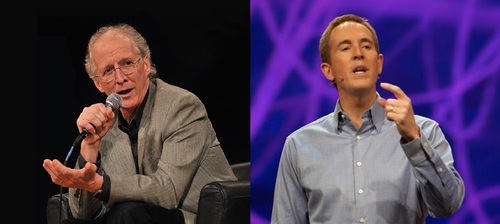
Foreword by RC: When I read John Piper’s response to Andy Stanley’s flagrant disregard for the authority of Scripture and the power of the Holy Spirit to use it to convict and convert, my first thought was, “wow, people are going to eat this up.” Piper has been given glowing accolades for far too long by the evangelical establishment. Piper’s response to Andy Stanley, in classical John Piper manner, was extremely nuanced, lukewarm, and deserving of a fair but firm critique. I think Bud’s rebuttal hits the proverbial nail on the head and exposes John Piper’s continuing compromise, his walking on both sides of the aisle, and his ever-growing desire to come off pleasing to man without offending anyone. An issue as pressing as the authority of God’s Word deserves the utmost attention and when Scriptural authority is challenged–especially by someone of Andy Stanley’s notoriety–a hard and thorough rebuke is in order. John Piper has failed to do so, and Bud has clearly exposed Piper’s response for what it is.
“Now let me say it as simply as I can … when it comes to spiritual life, when it comes to a person’s relationship to God, the Bible is all that is necessary for proper instruction … to make the man of God complete and capable of every good work.” — John MacArthur
“Why, then, does Andy Stanley deserve a pass? The fact that he is so influential is a reason to heighten the alarm, not tone it down.” — Phil Johnson
It’s been some two months since Andy Stanley’s stunning “Get The Spotlight Off The Bible” answer at an SBC Conference in which ERLC President Russell Moore posited the question, What would you do if you were the Protestant pope? That response correctly drew the righteous ire of many, the politically-correct ecclesiastical posturing of some, and a full-throated , “touch not God’s anointed” defense by others.
Discernment sites like Pulpit & Pen highlighted Stanley’s indefensible lack of defense of God’s Holy Word immediately in a number of articles. You can see them HERE and HERE and HERE and HERE, for example. Other discernment bloggers posted their own red-flag warning writs for those who do not understand the severity of his error.
Stanley’s answer at the ERLC, along with his concurrent Northpoint Church sermon series, “The Bible Tells Me So,” drew comments and criticism from notable evangelical leaders, scholars, pastors, and seminary presidents from across the country. His egregious comments almost demanded that the who’s who of evangelicalism respond. After all, we’re still – always – in a battle for the authority and sufficiency of Scripture – at least those of us who actually believe these fundamental tenets of the Christian faith.
One noticeably absent voice of contention or commendation on the Andy Stanley brou-ha-ha has been John Piper … until now. On his recent Desiring God blog, Piper addressed the Stanley problem. However, did Piper weigh in with an expected and vigorous defense of Scripture as the focal point of our faith, as the inspired Word of God, and, as the apostle Peter wrote, the source of “everything we need for life and godliness?” (2 Peter 1:3)
Actually …. NO. John Piper did not do this.
 Piper did not give a vigorous defense of Scripture, chiding Stanley for an ill-founded, Scripture-void approach to faith. What Piper gave was, in the words of our Lord to the church of Laodicea, lukewarm. (Revelation 3:14-22) Piper’s response was neither hot or cold. Far from obeying Christ’s Words to that church to “be zealous and repent,” Piper’s take on Stanley was a lukewarm response lacking a firm defense of God’s Word from a man that many have long lauded as a unique and compelling voice for truth in the church today.
Piper did not give a vigorous defense of Scripture, chiding Stanley for an ill-founded, Scripture-void approach to faith. What Piper gave was, in the words of our Lord to the church of Laodicea, lukewarm. (Revelation 3:14-22) Piper’s response was neither hot or cold. Far from obeying Christ’s Words to that church to “be zealous and repent,” Piper’s take on Stanley was a lukewarm response lacking a firm defense of God’s Word from a man that many have long lauded as a unique and compelling voice for truth in the church today.
Piper effectively gave tacit approval to Stanley’s “apologetic approach,” merely gently correcting him here and there on superfluous points in which Piper found him to be mistaken. It wasn’t much of a rebuke. Frankly, Balaam’s donkey uttered a stronger retort for his master’s strike against him for his God-prompted errant, off-road rambling than Piper has done for a man who proclaims the irrelevancy and unnecessity of God’s Holy Word.
But Piper’s response, erroneous and unhelpful as I find it to be, is itself founded on a mistaken premise. Piper responds to Stanley as though he were not making his comments within the structure of a sermon, but rather as though they were uttered in an apologetics training seminar for novice pastors. That’s the false premise.
“Now that Andy Stanley has responded so fully and helpfully to the critics of his sermon “The Bible Told Me So,” we may be able to sort out a few things about his method more carefully. My aim here is to state what I think Stanley is commending to preachers, and then suggest some questions that young preachers should ask before embracing Stanley’s method. He has important things to teach us, and I was helped by reading his rejoinder to his critics.” John Piper (Emphasis Added)
Andy Stanley’s illicit comments – despite his own efforts to defend himself, not to mention engaging superstar theologians to commend him – were not made in a training seminar to preachers. They were “preached” to a “church” during a Sunday morning “worship experience.” This was framed not as a training conference, but a church service. Where Stanley should have been found obedient to Paul’s command, “Preach the word,” (2 Timothy 4:2) he was found instead to be dismantling the Word in an effort that also disobeys Christ’s command to Peter to “feed my sheep.” (John 21:17) Stanley was not preaching to preachers. He was preaching to his church.
Disregard, for the moment, that, according to Stanley, one does not even need to be a follower of Jesus in order to be a member of Northpoint. (See HERE) One may join Stanley’s church in that manner, but one certainly will not be granted entrance into the eternal kingdom of Christ with such a loose, repentance-free profession. Those who do so will one day hear the woeful, final words, “Depart from me, I never knew you.” (Matthew 7:23)
Piper writes that “I am happy for this emphasis on the historicity and verifiability of the bodily resurrection of Jesus. It does surprise me, though. Because it means Stanley, at least on this point, is circling around behind postmodernism to the kind of historical, rational argumentation that marked my days in school, fifty years ago. If that is what he is doing, I think he is right.”
While Stanley’s claim to seek to bring back to the church those believers who left because of irreconcilable differences between the Bible and science may be laudable, this was not an apologetics training class. If Stanley is a legitimate pastor – I contend that he assuredly is not – feeding the sheep of Christ a twisted, back-door apologetic to address the faith-shattering impact of post-modernism is not the food they need. As Paul wrote, and as every authentic believer holds, “the gospel is the power of God for salvation.” (Romans 1:16)
God’s Word IS the power. It is His power to create. It is His power to regenerate. And it is His power to edify and sanctify. It alone is effective for the purpose which Stanley nobly claims to pursue. But the result of a Scripture-defied, Word-disregarding apologetic – even one that laudably focuses on the fundamental truth of the resurrection – is one that, at best, will create professors of a tenuous faith that has been mustered up through the application of reason – a reason which has commingled preferentially-plucked truth from Scripture that may be comfortably made to coexist with the much more obvious truth from science and culture. Such an approach may fill a pew at Northpoint, but it will not regenerate a soul.
Here’s what I mean. Saving faith is not the persuasion that the resurrection of Jesus rose bodily from the grave. That persuasion is essential to saving faith, but not the essence of it. The devil knows that Jesus rose from the dead, and he is not saved (see also Luke 16:31). The essence of saving faith is seeing the supreme beauty of Christ in the meaning of the event, and embracing him as Savior, and Lord, and the greatest Treasure in the universe. Satan does not see the crucified and risen Christ as supremely beautiful, and he does not treasure him. But believers do. That is the essence of saving faith. John Piper
Piper does have a creamy, savor your latte, enticing sort of way of saying and writing things, but putting aside his “it’s all about the beauty of Christ” response to Stanley’s focus on the resurrection, the question is, Is Piper right? Biblically right?
While Piper is perpetually all about a hedonistically (“Christian”) guided interpretation of faith, what is lacking in his “essence of saving faith” are two critical elements. Notwithstanding that the resurrection alone is not the complete Gospel, first, the Calvinist Piper recognizes saving faith is not something based on our unaided apprehension of either the sacrifice or “the supreme beauty of Christ.” It is exclusively based on the preferential work of God through His Holy Spirit via His read or proclaimed Word. But his comment in response to Stanley does not cite that utterly critical requirement for faith.
Faith is a divine gift, not, as Stanley’s apologetic seems to posit, the self-created, ginned-up gusto of coming to terms with apparently contradictory truths (those from science vs. those from the Bible) in order to thereby make a qualified profession of faith in a resurrected Christ. When salvation is divinely wrought by the Holy Spirit, at God’s discretion, along with it comes a growing illumination of His Word as Truth. The premise that we should, then, just eliminate the emphasis on Scripture is ludicrous. Unbelievers already don’t believe it. Yet God still saves … through His Word.
I’ve yet to witness to an unbeliever who refused to consider my defense of my faith because they found Scripture questionable. I know, and expect, that they find it dubious and, further, that they cannot understand it. But it neither limits me from responding to their questions logically and rationally nor does their Scriptural disdain preclude me from citing the truth God has proclaimed in His Word. The Word is the most effective tool I have in witnessing, not a device I should downplay, avoid, and discredit. The job of salvation belongs to the Lord, not me, and He manages yet to still save post-modern souls … by His Word. When He brings someone to the Truth, He will, most assuredly, grow them and sanctify them in that Truth. He gives the faith to believe His Word.
Secondly, Piper’s response, as does Stanley’s sermon, fails to cite or issue a full, clear presentation of the Gospel along with the oft-read New Testament-necessary appeal of “repent and believe.” At best, then, Stanley’s apologetic approach, lacking the Gospel and the Biblical command to “repent and believe” might create intellectual assenters to historical facts about Jesus, but will not provide the necessary truths through which God sovereignly and legitimately regenerates.
Piper’s response was as though Stanley were teaching a class of pastors on how (not to) defend the “most important” part of the Bible – the resurrection. But that’s not the context of Stanley’s derisive apologetic. He was preaching a Sunday morning sermon, or presuming to be doing so. Piper’s lukewarm response then, even if correct for would-be or novice pastors, is neither instructive as a defense of the faith for such a pastor who is told by God, in a pithy Pauline way, to “preach the word.”
The problems with Piper continue to represent an approach that is more a deferential defense of the faith, rather than a full-throated exhibit of Jude’s pointed “contend for the faith.” Piper’s problems, to be sure, are increasing and worrisome if you happen to hold to a strictly orthodox understanding of Reformed theology born exclusively out of Scripture. So while’s Piper’s continuationism has been tolerated as a tertiary issue, how helpful is his rather glowing view of Pentecostalism as the prevailing face of Christianity across the planet?
“Here is my definition of Pentecostalism: people who are believing in the power of the Holy Spirit, believing that the Holy Spirit does miracles today, believing that the gifts of the Holy Spirit described in 1 Corinthians 12 are still active today. That kind of people are at the cutting edge of the growth of Christianity around the world.” John Piper (Emphasis Added)
How helpful to the cause of advancing the Gospel as the power of God for salvation is Piper when he alludes to the almost dictation-like voice of the Divine delivering the contents of a recent book to him? (See HERE.) Such an implication is hardly orthodox, hardly one that reinforces the absolute centrality of God’s Word in the faith.
On cultural issues, Piper has presumed oddly non-orthodox positions on many things. From having to back track on comments about domestic abuse, to his anti-second amendment position, to his support for Black Lives Matter.
Piper has eagerly embraced such gratuitous characters as Rick Warren and Mark Driscoll. He finds no problem with false teachers, such as Beth Moore, teaching men. Whatever his discernment skills, they prove to be insufficient to preclude him from preaching aside the likes of Moore, or even the more highly noted false teacher and pastrix Christine Caine, as he will do at Louis Giglio’s Passion 2017.
“Every word of God proves true” Proverbs 30:5
Piper’s lukewarm deference shown to Andy Stanley might be expected. It might be tolerated. But it ought not to be welcomed. Reeking as it does of a kum-ba-yah spirit of “let’s just all get along,” Piper’s Laodicean response to Stanley itself fails to reinforce what Piper hopefully believes and that Stanley seems all too eager to abandon in his preaching and teaching: there is no substitute for Scripture.
Unless there was some divinely-issued addendum to Scripture and faith when the clock of modernism ticked to post-modernism, the voice of God through the two-millennia-old closed canon of Scripture remains fully and absolutely sufficient for the purposes of God. He has not recognized the need for an altered methodology of proclaiming His Truth, nor has He issued a Biblical amendment in light of 21st-century minds to whom His Word has suddenly become incapable of regenerating and sanctifying.
Though this meets with the certain chagrin of Stanley and the subtle endorsement of Piper, we are never called, under any circumstance, to yield first to the whims of man and then to the Word of God. A back-door, post-modern, apologetic isn’t what God expects of pastors in the pulpit. He expects them to “preach the Word,” (2 Timothy 4:2) and trust Him to do His work. “My word does not return void.” (Isaiah 55:11)
In an online response to Piper on Stanley, Phil Johnson gave a staggeringly clear response.
“It’s a mistake to imagine that if you aren’t willing to classify someone as a rank heretic, you’re always obliged to say things like, ‘He has important things to teach us’ or ‘join him . . .’ (4 times!). For the past several years Andy Stanley has repeatedly and increasingly said things that seem deliberately designed to undermine the authority and sufficiency of Scripture in his listeners’ minds. In this case, he was employing sophistry and subtle nuance to deny the principles we are taught in Isa. 55:11; Romans 1:16; 1 Cor. 1:18; Hebrews 4:12; all of Psalm 119; and a host of similar texts that stress the powerful efficacy of God’s Word compared to human cleverness. Expressions of contempt for citing the Bible as an authority (and the people who say such things) are not to be decorated with verbal lipstick and pimped as ‘important things’ for young and impressionable Christians to consider. Nor would we expect someone of Piper’s stature to treat such a low view of Scripture with that kind of deference if it was being peddled by some unknown, unemployable blogger merely parroting the Emergent movement a decade late. Why, then, does Andy Stanley deserve a pass? The fact that he is so influential is a reason to heighten the alarm, not tone it down.” Phil Johnson (See Below For Screen Clip)
While Stanley is an evident problem, Piper is increasingly becoming one himself. A heavy vaccine of Berean intervention needs to be employed for the latter, while “avoid them” (Romans 16:17) obedience is best prescribed for the former. As Christ clarified, to be his disciple – indeed, to become His disciple – one must “abide in my word.” (John 8:31) Beware those who suggest otherwise, or defend those who do.
For more on Andy Stanley, go HERE. For more on John Piper, go HERE.
[Contributed by Bud Ahlheim]












